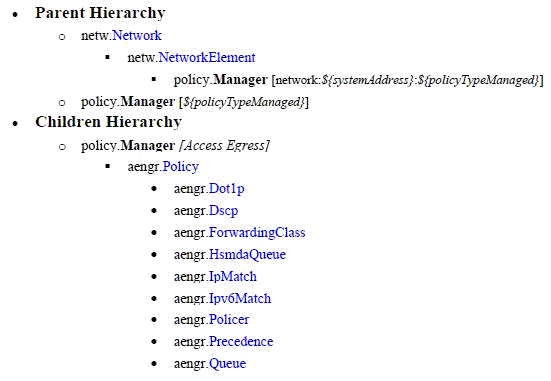Key packages and classes
Overview
The XML API supports the creation and modification of policies using the classes described in this section. The policy package contains classes to define and manage policies. Each policy is an instance of the policy.PolicyDefinition class. Policy items such as a queue of an access ingress policy, or an entry of an ACL filter are instances of the policy.PolicyItemDefinition. The specific policy is a child object of the policy.Manager. The types of policies in this section inherit from classes in this package.
The global policy represents a policy at the network level and the local policy represents a policy at the network element level. They are both children of the policy.Manager for the specific policy type.
Network level policy managers are named with the policyTypeManaged; for example, Access Egress. Network element level policy managers are named with network:siteId:policyTypeManaged; for example, network:10.1.1.88:Access Egress.
Note: policyTypeManaged is the displayed name of policy.PolicyType type.
Figure 18-1: policy.Manager class

The information in the policy.Manager class and policy.PolicyType provides an OSS developer with an introduction to classes, object hierarchy, and properties of policies to be configured. Other packages that may be relevant for a policy configuration OSS developer are the qos and acl packages. The packages define enumerations associated with properties in QoS-related policies such as access ingress, and access control lists such as ACL IP filters. The qos and acl packages do not have associated classes or methods.
The following tables list some of the policies and packages.
Table 18-1: Service management type policies
|
Policy |
Package |
|---|---|
|
QoS | |
|
Access Egress |
aengr |
|
Access Ingress |
aingr |
|
Network |
niegr |
|
Network Queue |
nqueue |
|
Slope |
slope |
|
HSMDA Slope | |
|
Shared Queue |
squeue |
|
Scheduler |
vs |
|
Port Scheduler |
portscheduler |
|
HSMDA Port Scheduler | |
|
Policer Control |
policing |
|
Queue Group |
qgroup |
|
QoS Profile |
qosprofile |
|
7705 Fabric Profile |
fabricqos |
|
OmniSwitch QoS |
aosqos |
|
7210 SAS QoS policies |
sasqos |
|
9500 QoS |
mpr |
|
Filter | |
|
ACL IP Filer |
aclfilter |
|
ACL MAC Filter | |
|
ACL IPv6 Filter | |
|
DHCP Filter | |
Table 18-2: Routing management type policies
|
Policy |
Package |
|---|---|
|
Multicast | |
|
Egress Multicast Groups |
multicast |
|
Multicast Package | |
|
Multicast CAC | |
|
Ingress Multicast Bandwidth | |
|
Ingress Multicast Info | |
|
Ingress Multicast Reporting Destination | |
|
7210 Multipoint Bandwidth Management |
sasqos |
|
VRRP | |
|
VRRP |
vrrp |
|
Routing | |
|
AS Path |
rp |
|
Community | |
|
Damping | |
|
Prefix List | |
|
Statement | |
|
MPLS | |
|
MPLS Admin Group |
mpls |
|
Shared Risk Link Group | |
|
LSP Template MVPN | |
|
ISA | |
|
IPSec Static Security Association |
ipsec |
|
IPSec Transform | |
|
IPSec Tunnel Template | |
|
IKE | |
|
NAT |
nat |
Table 18-3: Network management type policies
|
Policy |
Package |
|---|---|
|
Statistics | |
|
Accounting |
multicast |
|
File |
file |
|
RMON | |
|
RMON |
rmon |
|
Time of Day | |
|
Time Range |
tod |
|
Time of Day Suite |
todsuite |
|
Security | |
|
CPM Filter |
sitesec |
|
DoS Protection | |
|
User Profile | |
|
Password Policy | |
|
RADIUS Authentication | |
|
TACACS+ Authentication | |
Note: The terms distinguishedName, instanceName, and objectFullName are used synonymously in the XML API for the unique identifier of the object instance. See objectFullName element in Schema Reference for more information about the object full name.
To understand the notation used for creating the distinguishedName, or how to fill in a pointer property, see the Help link in the XML API Reference. For example, if you see the notation for a distinguishedName is Access Egress:${*id}:forwarding-class-${forwardingClass}, it means that to form the distinguishedName, the part in italics is the property value. For this distinguishedName, it could be Access:Egress:100:forwarding-class-be, where the 100 is the ${*id} and the be is the ${forwardingClass}. The value for a pointer property is the object full name.
© 2024 Nokia. Nokia Confidential Information
Use subject to agreed restrictions on disclosure and use.